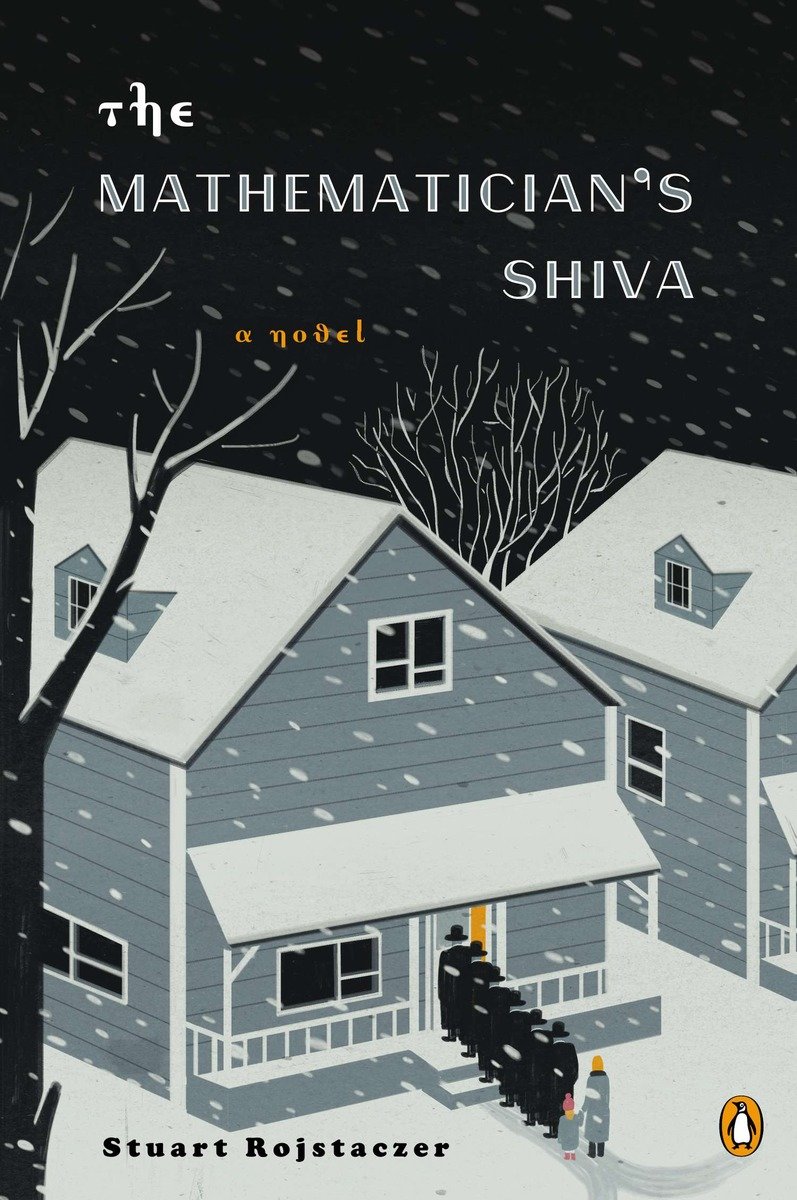The Mathematician’s Shiva: A Novel
14.00 JOD
Please allow 2 – 5 weeks for delivery of this item
Add to Gift RegistryDescription
WINNER OF THE NATIONAL JEWISH BOOK AWARD FOR OUTSTANDING DEBUT FICTION For readers of This Is Where I Leave You and Everything Is Illuminated, “a brilliant and compelling family saga full of warmth, pathos, history and humor” (Jonathan Evison, author of West of Here) When the greatest female mathematician in history passes away, her son, Alexander “Sasha” Karnokovitch, just wants to mourn his mother in peace. But rumor has it the notoriously eccentric Polish émigré has solved one of the most difficult problems in all of mathematics, and has spitefully taken the solution to her grave. As a ragtag group of mathematicians from around the world descends upon Rachela’s shiva, determined to find the proof or solve it for themselves—even if it means prying up the floorboards for notes or desperately scrutinizing the mutterings of her African Grey parrot—Sasha must come to terms with his mother’s outsized influence on his life. Spanning decades and continents, from a crowded living room in Madison, Wisconsin, to the windswept beach on the Barents Sea where a young Rachela had her first mathematical breakthrough, The Mathematician’s Shiva is an unexpectedly moving and uproariously funny novel that captures humanity’s drive not just to survive, but to achieve the impossible.
Additional information
| Weight | 0.33 kg |
|---|---|
| Dimensions | 2.21 × 13.42 × 20.22 cm |
| PubliCanadanadation City/Country | USA |
| by | |
| format | |
| Language | |
| Pages | 384 |
| publisher | |
| Year Published | 2014-9-2 |
| Imprint | |
| ISBN 10 | 0143126318 |
| About The Author | Stuart Rojstaczer was raised in Milwaukee and has degrees from the University of Wisconsin, the University of Illinois, and Stanford. For many years, he was a professor of geophysics at Duke University. He lives in Northern California. |
“The Mathematician’s Shiva is for everyone. . . . Optimistic and funny.” –Boston Herald “A delight….[Rojstaczer] delivers a smart, funny debut novel about family dynamics, the immigrant experience and the elegance of mathematics.” –San Jose Mercury-News “You can never really complain about a book being too alive, too curious, too alert, too true to itself. . . . The novel works for the same reason the humor [in it] does: It is smart, and brutally honest. Late in the narrative…Sasha rants about how Americans treat any show of intelligence as a display of bad taste. If he’s right – and he is – then The Mathematician’s Shiva is in very bad taste, and all the better for it.” –The New York Times Book Review “A hugely entertaining debut.” –Publishers Weekly “Rollicking. . . Rojstaczer’s humor and imagination keep the story moving, while delving into some of the more important issues of the last century. –The Jewish Daily Forward “A wryly funny coming-of-middle-age story . . . [and] a fresh look at family, genius, and the Jewish Eastern European immigrant experience.” –The Bellingham Herald “A family saga of human endurance, of adaptation, of exile, of love and loss . . . filled with humor, with wry observation, and with eccentric, quirky characters . . . Funny, poignant and thought-provoking.” –Chicago Jewish Star “A gripping, ground-breaking, intelligent novel, sure to become a book club favorite . . . and to be recommended by librarians and booksellers for years to come.” –The Wisconsin Jewish Chronicle “A poignant and at times funny novel that is a celebration of human endurance and the life of the mind.” –Durham Herald-Sun “Wonderfully quirky . . . [A] bittersweet novel . . . reminiscent of Jonathan Tropper’s This is Where I Leave You.” –Jewish Book World “[A] wryly funny first novel about middle-age, family, genius and the Jewish Eastern European immigrant experience after World War II.” –The Wisconsin Gazette “[Rojstaczer] obviously knows a thing or two about the insular world of academia, as well as the challenges and heartbreaks of growing up in an immigrant Jewish family. The result is an engaging novel that resonates emotionally while providing a math lesson or two along the way. –Jewish News "Effortlessly combine[s] laughter and tears . . . Like all shivas, there is time to both cry and laugh, and the overall effect is profoundly healing.” –Washington Jewish Week "A heartwarming novel…[about] the tremendous capabilities of the human spirit." –The Strait Times "Funny indeed. You risk many a giggle if you venture to read this secretly during a boring meeting. . . . It is certainly a novel I can recommend for mathematicians." –European Mathematical Society “An enjoyable debut…distinguished by a fluid, lyrical style.” –Kirkus “There are rock stars; then there are math stars. Apparently, both have their groupies, and this debut novel may win Rojstaczer a few….[His] tale maintains a satisfying balance between humor and warmth.” –Booklist “[Rojstaczer] has created a complex and chaotic rainbow of characters that makes his first novel both comedic and compelling.” –Library Journal “A funny, warm book, written by a geophysicist with a loving, detailed eye towards the beauty of math and the incorrigibility of people.” –7×7.com, “3 Books On Our Must-Read List This Week” “Highly recommended.” –San Diego Jewish Journal “A brilliant and compelling family saga full of warmth, pathos, history, and humor, not to mention a cast of delightfully quirky characters, and a math lesson or two; all together, a winning equation! When Rojstaczer writes about mathematics, you'd think he was writing about poetry.” –Jonathan Evison, New York Times bestselling author of West of Here and The Revised Fundamentals of Caregiving “I loved this smart, funny, big-hearted novel. As hilarious and wise as early Philip Roth, The Mathematician’s Shiva will delight and move you.” –Steven Strogatz, author of The Joy of x “Stuart Rojstaczer writes with enormous wit, style and empathy, and The Mathematician's Shiva is a big-hearted, rollickingly funny novel that's impossible to put down. A tremendous debut.” –Molly Antopol, author of The UnAmericans “I love The Mathematician’s Shiva. Who else will love it? Anyone who knows the manic world of the intellectually obsessed that Rojstaczer so perfectly captures, and anyone who loves dialogue that sparkles with wit, characters full of quirks and pathos, and a plot that fluctuates between hilarity and heartbreak.” –Rebecca Newberger Goldstein, author of 36 Arguments for the Existence of God and Plato at the Googleplex “Here is the rare book that invites us into the romance of pure mathematics and the very human company of those who spend their decades unknotting the abstractions that describe our reality.” –Lore Segal, author of Shakespeare’s Kitchen and Half the Kingdom “This funny, moving, perceptive look at one man's relationship to his eccentric mother and the legacy of her genius succeeds to the nth degree. Rojstaczer is a wise, warm-hearted, and wonderful new writer.” –Eric Puchner, author of Model Home “Stuart Rojstaczer has written a mathematician’s history of the family, full of challenging equations, emotional calculus and unexpected conclusions. The Mathematician’s Shiva is intricate, intelligent and funny, a pleasure to read.” –Roxana Robinson, author of Sparta “At last! The long hoped-for proof that a group of people even crazier than Yiddish-speakers can, in fact, exist.” –Michael Wex, author of Born to Kvetch |
|
| Excerpt From Book | ***This excerpt is from an advance uncorrected proof***Copyright © 2014 Stuart RojstaczerCHAPTER 1Tonight it’s Just Us“How’s your mother?” Yakov Epshtein asked. Yakov’s goatee was flecked with gray. Over the years his cheeks had ballooned and taken on a happy glow. His clothing choices for work had migrated from a cheap sagging suit, pressed white shirt, and thrift-store tie circa 1984 to a polo shirt and jeans with tasseled loafers sans socks. He was waiting, perhaps, for the day that global warming would bring the ocean to the Great Plains. This miracle, if it took place, would be welcome to Yakov but not necessary. Life in America had been good.I was in Yakov’s office, its well-worn vinyl floor covered with the grime of twenty years of use slightly mitigated by perfunctory cleaning. It was early afternoon eleven years ago, in the winter of 2001. The wind outside barely blew. The sky was crystal blue. Looking through the double-paned glass, those inexperienced with the Midwest might be fooled into thinking it was warm outside, at least warm for January. Both Yakov and I knew better. “My mother is hanging in there,” I said. “You know her. She’s not going down until she’s ready.”“A remarkable woman.” Yakov was from Russia. When a Russian mathematician mentioned my mother, this phrase “remark- able woman” would often follow. It was a phrase my father would use as well, but often in a sarcastic way.Yakov had come to the United States in 1986 and taught at the University of Nebraska in Lincoln. He was lucky to have eventually found this job. Many of my parents’ acquaintances who had emigrated from Russia in the 1970s and 1980s were doing things far afield from mathematics in order to put food on the table. I, unlike Yakov, had come to the United States as a young child. My memories of the former Soviet Union were fuzzy at best. Given what I had heard about Russia from my parents and their friends, I knew that this fuzziness was not a bad thing.I was giving a talk at Nebraska’s atmospheric sciences department, but when people in the math department heard I was coming, they filled up half of my appointment schedule. I was used to this. It was never about me. It was about my mother. She was the stuff of legend.She was five foot eight, a tall glass of water by European (and maybe even American) standards, who tended to tower over men, including my father, in her heels. She favored gray or burgundy suits tailored by a local dressmaker and owned well over two hundred pairs of shoes, an obsession that she said derived from her poverty during World War II. She would probably have been even taller had she not starved during the war. My mother never needed a microphone. When she spoke it was with the cadence of an oracle. She had been banned from teaching calculus at her university simply because she scared the hell out of freshmen.When my mother was ten years old, she was living in an Arctic Circle work camp where her father, a Jewish Pole/Russian (every decade or so, control of his hometown would change from one country to the other), was sentenced to hard labor for being a capitalist Enemy of the People. At school on the frozen tundra along the Barents Sea, my mother showed a remarkable facility for mathematics. In Russia, math is not just a means to an end. It’s a glorious art. Suddenly, my mother’s family got a little bit of meat and flour in addition to their wrinkled potatoes and onions. Another Enemy of the People, a professor of mathematics, was told to tutor my mother three times a week. Like many, he never made it back home.My mother, formerly a Pole, then a full-fledged citizen of the glorious USSR due to the Soviet annexation of her hometown after the war, was sent to Moscow for further study in 1945. These were heady times in Russian mathematics, and the most admired mathematician of all was her advisor, the great Kolmogorov. My mother began to publish papers when she was sixteen. She defected to the West in 1951, after giving a talk in East Berlin. My mother became a tenured professor at the University of Wisconsin at the age of twenty-two. At twenty-eight, she was offered a tenured professorship at Princeton, which somehow promised to ignore its rules on nepotism and hire my father as well. She turned them down. Like Kolmogorov and many of his acolytes, she believed that cold weather was required for the creative mind. New Jersey simply was too warm. Plus, according to her, Princeton was a haven for anti-Semites, and she’d already had her fill of that in Russia and Poland. She stayed in Wisconsin.In 1999, after sixty-nine years without a single major health issue, my mother was diagnosed with advanced lung cancer. Her doctor told her to expect to live three to six months. “Nonsense,” she said. “I have a good year of things to do.”A year and a half later, she was down to eighty-five pounds. As I walked out of Yakov’s office, I got the call on my cell phone. “I’m going to die today,” she said. |
Only logged in customers who have purchased this product may leave a review.






Reviews
There are no reviews yet.